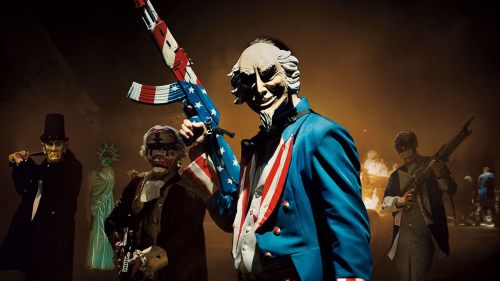THE FIRST PURGE Review: Born In The Ghettos
The Purge pictures are special, mostly because they've offered up perhaps the purest examples of modern exploitation cinema being made with a mainstream mindset. Beginning with a simple hook – for one night in America each year, crime has been legalized by the government as a means of spiritually "cleansing" the nation of its vilest impulses – writer/director James DeMonaco created a hyper-violent, satirical vision of the US that smuggled a great deal of dorm room sociopolitical commentary inside of its preposterous narrative conceit. It's the Larry Cohen “elevator pitch” approach to schlock fiction: deliver a logline-ready premise the viewer is instantly intrigued by, and then black bag a healthy dose of subversion inside your superficially innocuous B-Movie.
With each entry, DeMonaco widened the scope of these Perverted States of America, with The Purge acting almost like the series' Night of the Living Dead – zeroing in on a white family who profited from the state mandated 12-Hour slaughter, as their patriarch (Ethan Hawke) made a mint off high-priced security systems. Through TV and radio broadcasts, we receive updates regarding the outside world, all while these privileged folks fight off a gang of preppie, masked thugs, looking to get their own pound of flesh. If that movie was Night, then Anarchy is essentially the opening twenty or so minutes from Dawn of the Dead, as we try to survive on the streets with a grieving policeman (Frank Grillo) looking to take revenge on the man who stole his son's life. Suddenly, the broadcasts that wormed their way into our ears and eyes during the confined inaugural chapter are brought to life in vivid, vicious detail.
Election Year plays like a rehash of the first sequel's Escape From America formula, only it also allows us to peek behind the curtain and glimpse the political mechanizations that put this rather barbaric practice into place. While small business owners struggle to pay Purge Insurance premiums to protect their storefronts, figureheads inside the New Founding Fathers (or NFFA) – a radical fringe party that rose to power amidst economic collapse and widespread societal chaos (and closely resembles our current Right Wing Republican regime, right down to the flag pins) – fear a new candidate (Elizabeth Mitchell) who wants to take down their precious psychological tetanus shot. Like the first two movies, these developments are all delivered with the lunkheaded subtlety of a jackhammer, yet watching pieces of filmic pulp this simultaneously angry and populist remained utterly thrilling.
The First Purge is an extension of Election Year’s explorations of a fictitious legislative agenda. However, before this nefarious law can be implemented, an experiment must first be performed. We're no longer in the near future, as the narrative now remains somewhat in the present (give or take a shamelessly placed poster for Blumhouse’s upcoming Halloween remake). The NFFA’s implemented a Purge Night test run on Staten Island. Recruiting the poor and downtrodden – from bored social security starved geriatrics to drug addicts – the "scientific study" (headed by a bleached blonde Marisa Tomei as Dr. Updale, or "The Architect") offers a financial incentive to those willing to participate. All that's required of individuals looking to submit themselves to observation is that they wear a pair of high-tech contact lenses (which allow researchers to see through applicants’ eyes) and commit to unleashing their wildest desires until dawn.
Thankfully, DeMonaco hands the franchise's reins over to a new filmmaker for the first time in its existence (though he remains as the sole credited scribe), and the director of choice for this “Reagan Crack Era” Purge just happens to be a person of color. Gerard McMurray – whose only other feature credit is Netflix’s black fraternity hazing nightmare Burning Sands – brings an authenticity to what's essentially the series’ Blaxploitation chapter, complete with its own Superfly hero in Y'lan Noel's project kingpin Dmitri. It's the difference between watching Larry Cohen craft Black Caesar and Ossie Davis construct Cotton Comes to Harlem. The proof is in the point of view – from The First Purge’s dialect to its rageful ethos to its trap rap soundtrack – which, try as DeMonaco may, just doesn't resonate with the same fist-raised truth without a black man behind the lens.
The rage that simmers beneath the surface of this black Island community can be felt even as its residents express their fear of looming doom that their government is hanging over their heads. Tenement neighbors like Nya (Lex Scott Davis) and Dolores (Mugga) ask each other how they're doing with a hitch in their voices, before wondering aloud just how bad this "experiment" is going to be. Corner kids such as Isaiah (Joivan Wade) try to determine whether signing up is an easier way to make ends meet than simply slinging rocks to vicious fiends like Skeletor (a truly ghoulish Rotimi Paul). Meanwhile, Dmitri rallies and arms his troops, letting them know they're not going to move their stash or retreat from their neighborhood, nor is he allowing his soldiers to entertain this white man's genocide, as doing so is merely playing into "what they'd want".
There's a fantastic moment in Paul Schrader's Blue Collar where Richard Pryor's Detroit auto line worker (who's just been promoted to supervisor) tries to express to his colleague (played by Harvey Keitel) how terrified he is of betraying his white overlords. "They're gonna come into my house and fucking kill me, man," he shouts with an alarming amount of conviction, and The First Purge feels like the schlock expansion of those racial anxieties. Military grade weapons are mysteriously finding their way into the hands of Dmitri's enemies, and once the experiment kicks off, white gangs dressed as KKK members seemingly appear out of nowhere. McMurray amalgamates a mountain of loaded imagery into surrealist violence, all while terrified parishioners gather in a black church, hoping it can provide some sort of sanctuary during the storm (minor spoiler: it doesn't). This is ethnic cleansing hiding under the guise of a spiritual one.
The First Purge could also arguably be the first in this franchise to comment upon its audience's fascination with the violence in the streets. From their observation towers on high – safely removed from the atrocities happening below – the researchers and their media counterparts are attempting to quantify and intellectualize these primal happenings. Why are the participants wearing masks? Why are they getting such enjoyment from murder and robbery? Would we act any differently if the roles were switched? As a conspiracy unfurls from the control room – the NFFA's liaison (Patch Darragh) coordinating the party's own agenda behind Dr. Updale's back – it's no coincidence that those allowed to ask these questions are all white, while others stuck fighting for their lives are exclusively folks of color. It's a sly annotation on the privilege of the movies’ artistic intent (not to mention their creator) that's never actually spoken aloud, yet represented almost purely through casting.
By the time we reach the film's climax, McMurray (with the aid of cinematographer Anastas N. Michos) has whipped up a near psychedelic barrage of smoky, fascistic imaginings, as gang commanders dressed in Nazi regalia (flanked by soldiers in blackface masks) try to kill everyone in a public housing high-rise, before Dmitri literally strangles one of these minstrel massacre artists to death. This one brief scene of our hero choking out a faceless stormtrooper of his people’s apocalypse makes the message behind McMurray’s movie quite clear: this is a work of pop insurrection. While we’re bombarded daily by speeches from a President who wants to “build a wall” and partially blames anti-fascist protestors for a death of their own in Charlottesville, movies like The First Purge feel like vital howls of rage that just happened to muscle their way into your local multiplex. This is the most inflammatory type of mainstream filmmaking – a call to arms on your FM dial – and to deny it seems like an act of pure foolishness.
The First Purge is in theaters now.



